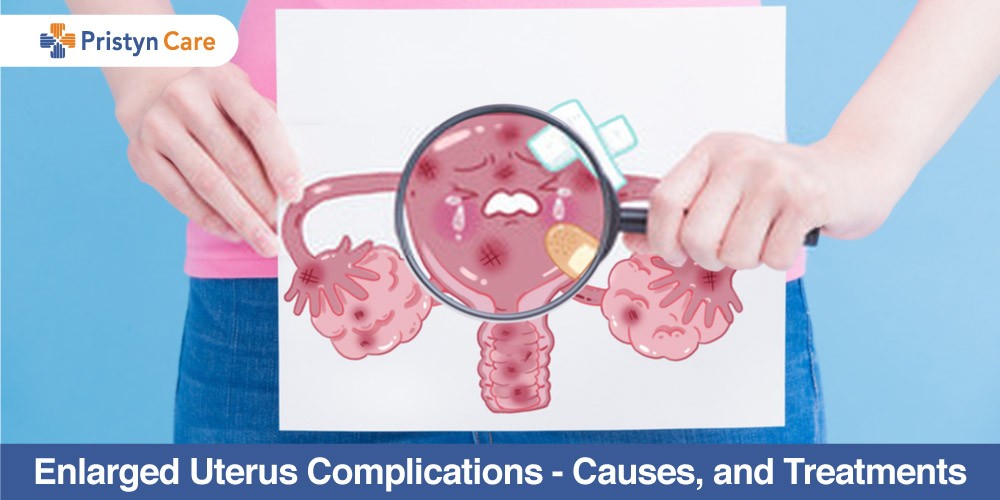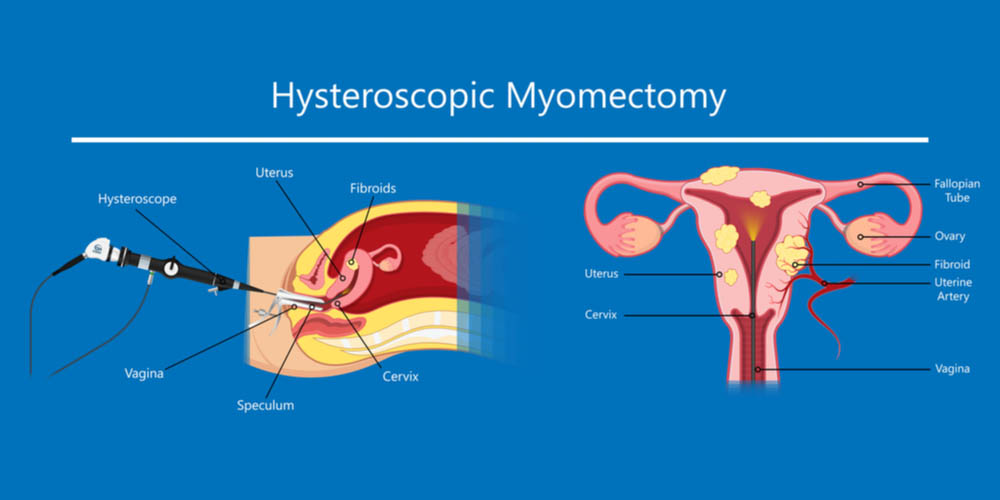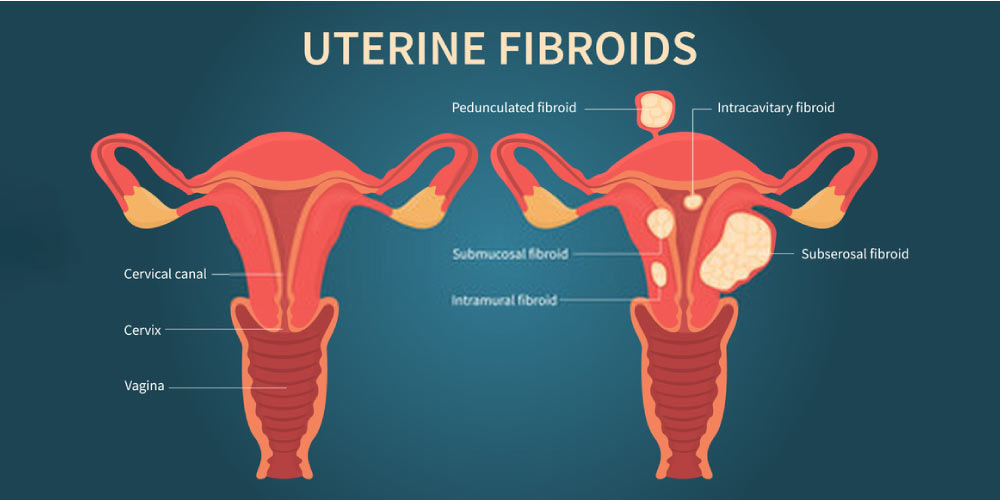
These days, many around the world face one or the other reproductive health issue. The major reason owing to this is considered to be the fast-paced stressful lives and unhealthy eating habits.
The common symptoms of an enlarged uterus include heaviness in the lower abdomen and frequent urge to urinate.
Table of Contents
Some other symptoms that may indicate an underlying uterine issue include:
- Frequent spotting (bleeding between periods)
- Irregular menstrual cycle
- Constipation
- Heavy and painful periods
- Leg cramps due to pressure
- Intense in the lower back
A female having the problem of uterus enlargement may not necessarily experience all the symptoms at once. Thus, proper timely diagnosis is necessary to get a clear understanding of the condition.
You should also know of the complications that can arise if you do not seek the timely treatment for an enlarged uterus.
These are the complications associated with the problem of the enlarged uterus:

Reduced Fertility
proper treatment is not received, the enlarged uterus can adversely affect the woman’s fertility. This happens because the change in shape and size of the uterus and cervix can make it difficult for the sperm to move around in the uterus, reach the egg and then fertilize it. Also, the enlarged uterus can also block the fallopian tubes and thus make the fertilization process difficult.
Preterm labor and C-section

The enlargement or inflammation of the uterus can also increase the risk of childbirth complications like preterm labor and C-section. Studies have shown that women with enlarged uteruses are at 2.5 times greater risk of preterm labor. In a similar manner, the risk of cesarean section is also elevated.
Complications during pregnancy
In severe and prolonged cases, uterus enlargement can also lead to pregnancy complications and may even result in miscarriage. In some cases, recurrent miscarriages may also occur. In most cases, the woman miscarries during the first trimester of her pregnancy.
Infection due to uterine inflammation
Uterus enlargement leads to inflammation in the reproductive tract. This inflammation, in turn, can increase the risk of recurrent vaginal or reproductive tract infections and can put you through a lot of unwanted troubles.
Prolapsed Uterus
Prolapse of the uterus is a condition in which the uterus expands to such an extent that it distends out of the body. This usually happens due to the weakening of the pelvic floor muscles. Although it is not a life-threatening condition, surgery is required to correct a prolapsed uterus.
By now, you must be aware that it is certainly not easy to live with an enlarged uterus. Also, another question that arises is what causes or factors that contribute to the enlargement of the uterus?
What causes the uterus to become enlarged
Uterine fibroids and adenomyosis are the two most common causes of an enlarged uterus.
Let’s quickly get an insight into these two and the most prevailing causes of uterus enlargement.
Uterine Fibroids

Fibroids are the most common cause of enlarged uterus. Uterine fibroids are non-cancerous growths that develop inside the uterus or uterine walls. These lump-like structures form due to excess of estrogen and progesterone in the body and can be quite discomforting. Uterine fibroids can be as small as a pea and can grow large enough to weigh several pounds.
Large fibroids can pressurize the uterine walls and can stretch the uterus to an extent such that it may appear like the woman is pregnant. Very large uterine fibroids affect the uterus in the same way as a 14-week pregnancy would.
Adenomyosis

In adenomyosis, the uterine lining grows into the uterine wall. Like uterine fibroids, adenomyosis is also strongly linked with estrogen levels in the body. Adenomyosis looks and behaves like uterine fibroids and thus many a time, adenomyosis is confused to be a fibroid.
Adenomyosis can lead to swelling in the uterus and lower abdomen and can lead to enlargement of the uterus. Studies have revealed that a uterus with adenomyoma can become almost twice or thrice of its original size.
Some other causes of uterus enlargement include:
Polycystic Ovarian Syndrome- Polycystic ovarian syndrome is another reproductive condition that can lead to an enlarged uterus. It occurs due to hormonal imbalances and can cause accumulation of the endometrial lining. This can result in inflammation and can cause the uterus to enlarge.
Menopause- Fluctuation in hormone levels during the period before menopause can also result in the enlargement of the uterus. However, this enlargement is mostly temporary and the uterus goes back to its normal size after menopause.
Ovarian Cysts- Ovarian cysts usually don’t cause much harm, but severe ovarian cysts that are too large in size can lead to an enlarged uterus and other complications.
How to treat the enlarged uterus?
In mild cases of uterus enlargement, home remedies and medications can provide relief from the pain and menstrual symptoms. However, in severe cases, surgery may be required. Relax, the modern surgeries of the uterus are not all complex and cause only minimal discomforts. All you have to do is just be well aware of the treatment that you choose and ofcourse pick the right doctor.
For uterine fibroids, myomectomy can help. In myomectomy, the surgeon removes the fibroids without affecting the uterus at all. This is usually done through the use of a laparoscope.

For other causes of uterus enlargement and even for severe cases of uterine fibroids, hysterectomy may be advised. Hysterectomy is the partial or complete removal of the uterus through surgical means.
Laparoscopic hysterectomy is currently the most widely used procedure for removing the uterus. It is a minimally-invasive and safe procedure and is very effective as well.
This laparoscopic surgery is available in Pristyn Care. Our doctors are highly skilled and specialize in carrying out the minimally invasive procedure of laparoscopic surgery with absolute precision. There is no major scarring or any deep wounds to heal. Thus, it is fair to call it minimally invasive surgery.
We would also like to give you a few lifestyle and dietary tips to deal better with the problem of an enlarged uterus:

- Have more anti-inflammatory foods to keep the symptoms under control. Ginger, green leafy vegetables, blueberries, broccoli, chia seeds, etc should form an integral part of your diet.
- Pelvic massage also immensely helps in relaxing the muscles of the lower abdomen. Thus, massaging provides instant relief and improves blood circulation.
- Increase the intake of fiber-rich foods. Dietary fibers help in naturally keeping the uterus free from toxins. Nuts, oats, whole grains, apple, mango, orange, kiwi, grapefruit, etc are the rich natural sources of fibers. (Also read: Best foods for uterine fibroids)
- Stay hydrated! Drink lots of water, coconut water, fresh fruit, and vegetable juices regularly.
- Kick away obesity! Move your body, exercise, practice yoga. Set a fitness routine and you will surely witness amazing improvement in your uterine health.
Take Away
Leading a healthy, balanced is the key to prevent most of the uterus related problems at bay. Also, seeking a gynecologist’s advice whenever any troublesome symptoms surface is the wise and right thing to do. Always remember that indulging in self-medication can worsen the problems related to the uterus by disrupting the hormonal balance.
Thus, if you want to receive the right treatment without the fear of any complication, contact us at Pristyn by booking your online appointment. Ensuring your good health is our priority.
Also Read:

















